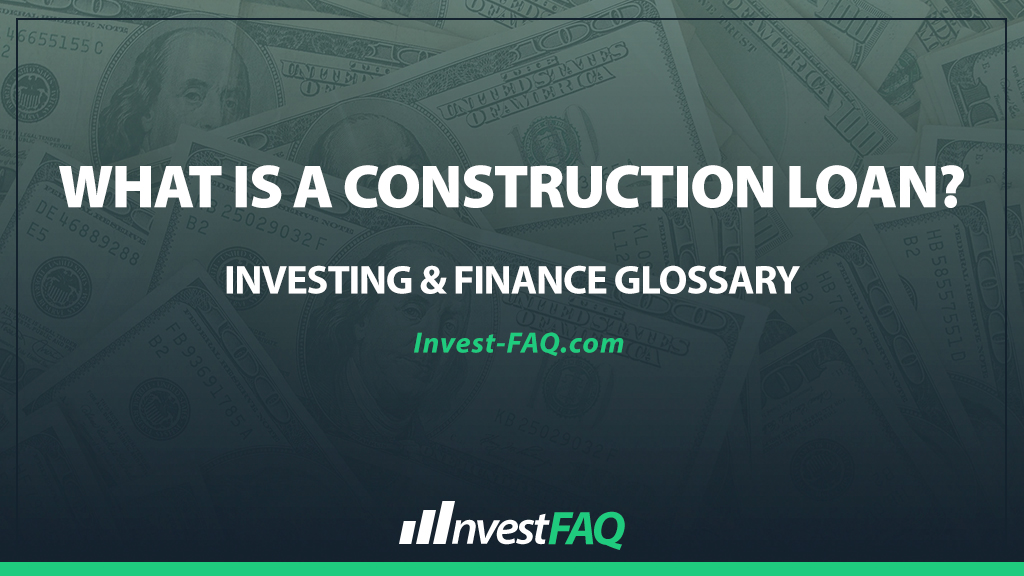
Construction Loan
Contents
A construction loan is a short-term, interim loan used to finance the building of a property or real estate project. Unlike traditional loans, which provide a lump sum of money to the borrower, construction loans typically disburse funds in stages as the project progresses and reaches certain milestones.
In the realm of real estate development and construction, these loans are crucial for covering the upfront costs associated with building projects before permanent, long-term financing is secured.
Construction loans are often used by developers and builders to finance residential, commercial, or industrial projects, providing the necessary capital to begin and complete construction work.
Example of a Construction Loan
“Skyline Developers” embarks on constructing a new residential complex and secures a construction loan of $2 million. The loan agreement specifies that funds will be released in four $500,000 increments, tied to the completion of specific construction phases: foundation laying, framing, roofing, and finishing.
Loan Amount: $2 million
Disbursement Schedule:
$500,000 upon foundation completion
$500,000 after framing
$500,000 following roofing
$500,000 upon finishing
Interest: Interest only on the funds as they are disbursed, transitioning to a regular amortizing loan upon completion.
In this scenario, “Skyline Developers” uses the construction loan to manage cash flow efficiently throughout the project. As each phase of construction is completed, the lender inspects the progress and releases the next installment of funds.
This draw schedule aligns the financing costs closely with the project’s progress, allowing “Skyline Developers” to pay interest only on the portion of the loan that has been disbursed, rather than the entire loan amount.
Upon project completion, the construction loan might be converted into a traditional mortgage or paid off through permanent financing obtained by the developer.
Significance for Investing & Finance
The accounting for construction loans is significant for several reasons:
Cash Flow Management: Construction loans help businesses manage cash flow by providing funds exactly when needed, which is crucial for maintaining liquidity during the construction phase.
Interest Expense Recognition: The interest on construction loans is typically recognized as an expense in the period it incurs, which can impact the financial statements and profitability during the construction period.
Project Financing: Construction loans are a key component of project financing, influencing the total cost of the project and the financial feasibility of construction ventures.
Balance Sheet Presentation: The drawdowns from construction loans increase liabilities on the balance sheet, while the construction in progress (CIP) account reflects the ongoing investment in the property on the asset side.
In summary, a construction loan is an essential financial tool for developers and builders, providing the necessary funding to initiate and complete construction projects.
From an accounting perspective, these loans require careful management and recording, as they affect cash flow, interest expenses, and the overall financial presentation of the company undertaking the construction project.
FAQ
What distinguishes a construction loan from a traditional mortgage?
A construction loan is a short-term loan used to finance the building or renovation of a property, where funds are typically disbursed in stages based on construction progress, unlike a traditional mortgage that provides a lump sum for purchasing a completed property.
How are interest payments handled during the construction phase of a loan?
During the construction phase of a loan, borrowers often make interest-only payments calculated on the portion of the loan that has been disbursed, transitioning to regular principal and interest payments once construction is completed and the loan converts to a permanent mortgage.
What criteria do lenders use to approve a construction loan?
Lenders typically require detailed construction plans, a realistic budget, a timeline for the project, and often a higher down payment compared to traditional loans, assessing the borrower’s creditworthiness and the project’s feasibility before approval.
Can a construction loan cover both the land purchase and building costs?
Yes, a construction loan can cover both the purchase of the land and the building costs, providing a comprehensive financing solution for borrowers looking to buy a plot and construct their home or property on it.
